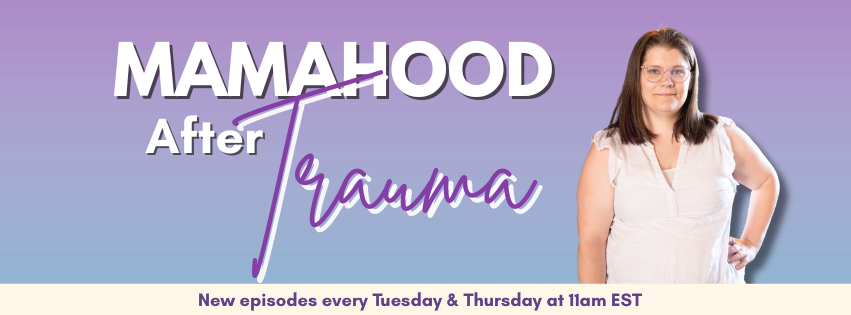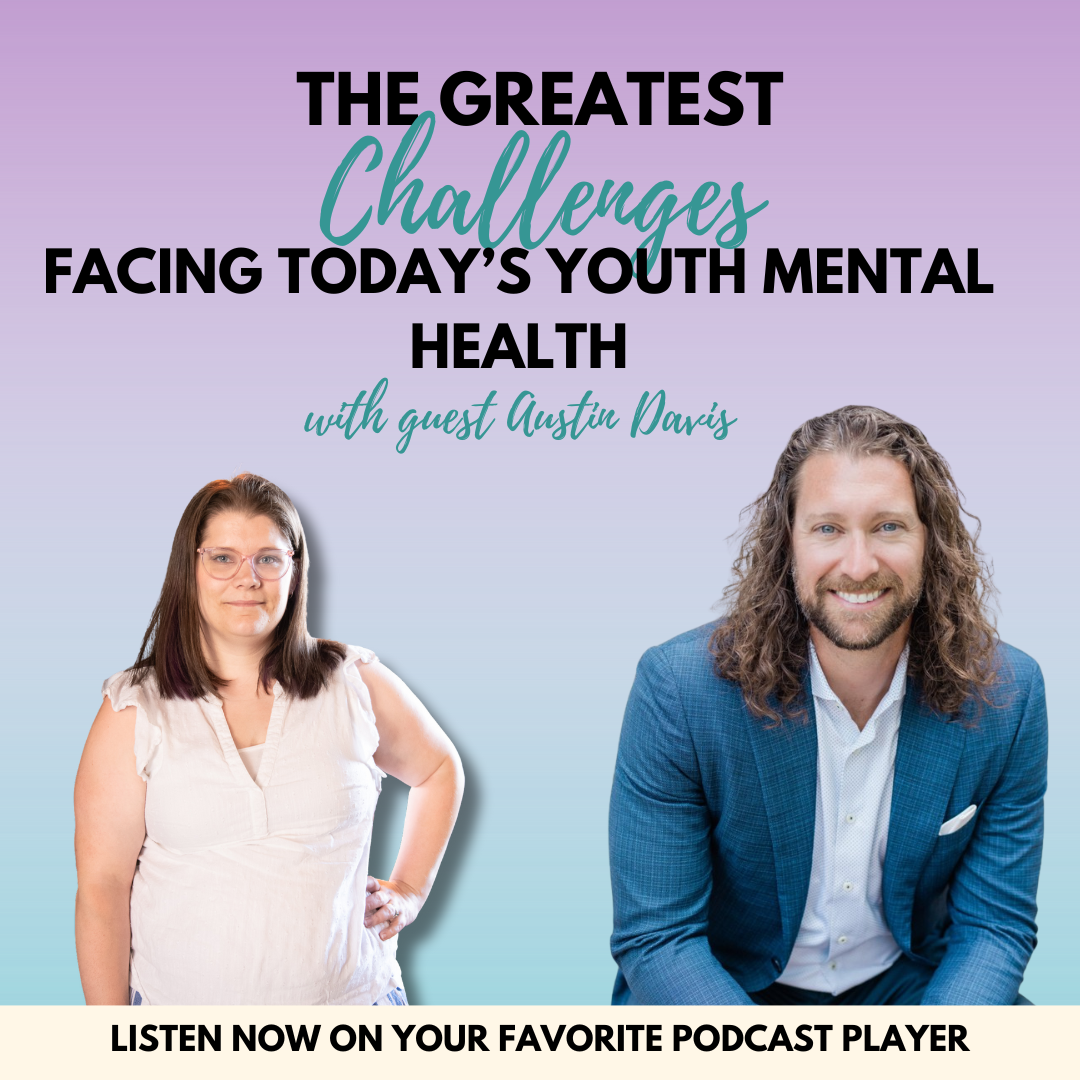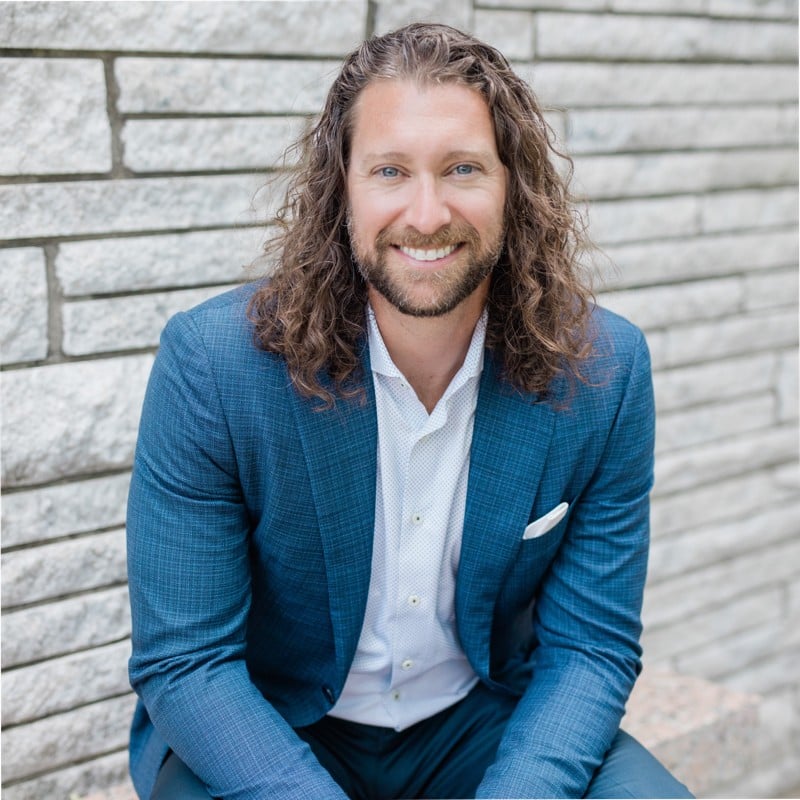
The Greatest Challenges Facing Today's Youth Mental Health
In this episode of "Mamahood After Trauma," host Emily welcomes licensed professional counselor Austin Davis to discuss the growing mental health challenges facing today’s youth.
Together, they explore the impact of trauma, technology, and family fragmentation, as well as the unique struggles of neurodivergent children.
Austin shares expert insights on how undiagnosed neurodivergence can lead to substance use and offers empowering advice for mothers advocating for their children.
The conversation inspires hope, emphasizing community support and proactive action as essential tools for healing and growth.

Table of Contents
Introduction and Guest Welcome (00:00:00) Emily introduces the podcast, offers a free resource, and welcomes guest Austin Davies.
Austin’s Background and Experience (00:01:11) Austin shares his professional background in counseling and work with youth mental health and substance use.
Current State of Youth Mental Health (00:02:02) Discussion on worsening youth mental health symptoms and increasingly scarce resources.
Impact of Technology and Family Fragmentation (00:03:19) Explores how technology and fragmented families contribute to youth mental health challenges.
Neurodivergence Awareness and Diagnosis (00:05:00) Conversation about increased awareness and diagnosis of neurodivergence in current generations.
Undiagnosed Neurodivergence and Coping (00:06:15) Austin discusses the effects of undiagnosed neurodivergence and how youth seek resolution, sometimes through substance use.
Parental Advocacy and Medical Pushback (00:08:08) Emily shares her advocacy experience; Austin gives advice to parents facing resistance from professionals.
Empowering Parents and Navigating the System (00:09:19) Advice for parents to be informed, empowered, and cautious when dealing with medical professionals and the system.
Substance Use and Neurodivergence Connection (00:12:03) Explains why neurodivergent youth may use substances to self-regulate and the social/moral dynamics involved.
Hope and Community Support for Parents (00:15:06) Austin offers hope, encourages seeking help, and highlights the value of community and professional support.
How to Connect with Austin (00:16:02) Austin shares how listeners can find him online and mentions his book.
Closing Remarks (00:16:32) Emily and Austin thank each other, and Emily closes the episode with encouragement and a reminder about the free resource.
Navigating Motherhood After Trauma: Expert Strategies for Supporting Neurodivergent and At-Risk Youth
In a recent episode of the "Mamahood After Trauma" podcast, host Emily sat down with Austin Davis, a licensed professional counselor and founder of Clear Fork Academy, to discuss the rising tide of youth mental health challenges, the impact of trauma and family fragmentation, and the nuanced realities of neurodivergence in today’s children and teens. This conversation is a must-listen for any parent, especially mothers navigating the complexities of raising children after trauma, and those advocating for neurodivergent kids in a world that often misunderstands them.
Below, we break down the main themes and actionable insights from the episode, offering a comprehensive guide for parents seeking to support their children’s mental health and well-being.
Understanding the Current Youth Mental Health Crisis
Austin Davies highlights a sobering reality: youth mental health issues are worsening, and resources are becoming scarcer. The symptoms are more severe, and the support systems that once helped families are stretched thin.
Key Insights:
- Increased Severity: Youth are presenting with more complex and acute mental health symptoms than in previous decades.
- Resource Scarcity: Waitlists for quality mental health professionals can be six weeks or longer, leaving families in limbo during critical periods.
- Systemic Challenges: The ballooning crisis is compounded by systemic issues in healthcare, education, and social support.
Actionable Advice:
- Be Proactive: Don’t wait for a crisis to seek help. Early intervention is crucial.
- Document Concerns: Keep a journal of your child’s behaviors, symptoms, and any interventions you try. This can be invaluable when seeking professional help.
- Leverage Community Resources: Look for local support groups, online communities, and school-based services.
The Double-Edged Sword: Technology and Family Fragmentation
Davies points to two major societal shifts impacting youth mental health: the pervasive influence of technology and the fragmentation of the family unit.
Technology’s Impact
- Social Disconnection: While technology connects us globally, it often isolates individuals within families. Face-to-face communication skills are eroding.
- Information Overload: Constant exposure to social media and digital content can overwhelm young minds, increasing anxiety and stress.
Family Fragmentation
- Complex Communication: Divorce, blended families, and non-traditional family structures add layers of complexity to communication and emotional support.
- Loss of Stability: Fragmented families may struggle to provide the consistent, nurturing environment children need to thrive.
Actionable Advice:
- Set Tech Boundaries: Establish device-free times (e.g., during meals or before bed) to encourage real conversations.
- Prioritize Family Rituals: Even simple routines—like a weekly game night—can foster connection and stability.
- Open Communication: Regularly check in with your child about their feelings and experiences, both online and offline.
Neurodivergence: The Hidden Struggle
A central theme of the episode is the prevalence and impact of undiagnosed neurodivergence (such as ADHD and autism spectrum disorder) in youth.
The Cost of Late or Missed Diagnosis
- Misunderstood Behaviors: Neurodivergent children are often punished for behaviors that are symptoms of their condition, not willful disobedience.
- Self-Medication: Many turn to substances like marijuana to “feel normal,” seeking relief from overwhelming thoughts or sensory input.
- Delayed Self-Understanding: Adults diagnosed later in life often describe a sense of clarity and relief, but also regret for years spent misunderstood.
Actionable Advice:
- Trust Your Instincts: If you suspect neurodivergence, pursue assessment—even if professionals initially dismiss your concerns.
- Educate Yourself: Learn about neurodivergent conditions and how they present differently in children, especially in girls and marginalized groups.
- Advocate Relentlessly: Be prepared to push back against dismissive professionals. You know your child best.
Advocating for Your Child: Navigating the Medical System
Emily and Austin both emphasize the when dealing with medical and educational professionals.
Navigating the System
- Know Your Rights: Laws regarding education, healthcare, and parental authority vary by state. Familiarize yourself with local regulations.
- Build a Team: Seek out professionals who respect your expertise as a parent and are willing to collaborate.
- Second Opinions Matter: Don’t hesitate to seek alternative perspectives if you feel your concerns are not being taken seriously.
Actionable Advice:
- Document Everything: Keep records of appointments, recommendations, and your child’s progress.
- Use the Internet Wisely: Research reputable sources and connect with other parents for support and information.
- Balance Professional Advice with Parental Intuition: Medical professionals are valuable guides, but they are not infallible. Use their input as part of a broader decision-making process.

Substance Use as Self-Regulation: What Parents Need to Know
A critical insight from Davies is that substance use among neurodivergent youth is often an attempt at self-regulation.
Why It Happens
- Nervous System Overload: Substances like marijuana can “turn down the volume” on an overactive brain, providing temporary relief.
- Social Dynamics: Substance use can become a way to fit in, make money, or feel competent in a world that often feels overwhelming.
The Risks
- Cycle of Destruction: Temporary relief can lead to dependency, legal issues, and further mental health challenges.
- Moral Ambiguity: Youth may not see the harm in using or selling substances, especially if it helps them function.
Actionable Advice:
- Open, Nonjudgmental Dialogue: Talk to your child about substance use without shaming or lecturing. Seek to understand their motivations.
- Address Underlying Needs: Work with professionals to find healthier ways for your child to regulate their nervous system (e.g., therapy, exercise, mindfulness).
- Monitor and Support: Stay engaged in your child’s life, know their friends, and be alert to changes in behavior.
Hope and Action: Building a Supportive Community
The episode closes with a powerful message: there is hope, and action is possible—even in the face of daunting challenges.
Key Takeaways
- You Are Not Alone: Many families are navigating similar struggles. Community support is invaluable.
- Don’t Delay: If you sense something is wrong, act. Early intervention can make all the difference.
- Empowerment Through Knowledge: The more you learn, the better equipped you are to advocate for your child.
Actionable Advice:
- Join Support Groups: Whether online or in-person, connecting with other parents can provide emotional support and practical advice.
- Access Free Resources: Download guides like Emily’s “Unlocking Peace Guide” to start building your own toolkit for managing stress and triggers.
- Celebrate Small Wins: Progress may be slow, but every step forward counts.
Expert Resources and Next Steps
Connect with Austin Davis:
- My book: My Kid, My Crisis: https://www.amazon.com/My-Kid-Crisis-Austin-Davis/dp/B0DN7S1... /
- Clearfork Academy Website: https://clearforkacademy.com/
Download Emily’s Free Resource:
Final Thoughts
Raising children after trauma, especially those who are neurodivergent or at risk for substance use, is a journey filled with challenges—but also hope. By staying informed, building supportive communities, and trusting your instincts as a parent, you can help your child navigate the complexities of today’s world and thrive.
Remember: You are not alone. There are resources, professionals, and communities ready to support you and your family every step of the way.
About Austin Davis

Austin is a visionary leader in teenage behavioral health and addiction treatment, spending the past 15+ years committed to transforming the lives of teens & their families. He uses the power of faith in the recovery process to help his clients grow into healthy and happy members of their community.
His dedication to teen mental health makes him a driving thought leader in the industry. He has spoken to parents, community health professionals, educators and teens nationwide—sharing insights on effective treatment methodologies, the importance of mental health awareness and the power of faith in the recovery process.
Published in 2023, My Kid, My Crisis by Austin Davis, dives into the inspiring journeys of families who have faced challenges of mental health and substance abuse issues with their teens.
By sharing these stories, My Kid, My Crisis aims to foster a sense of community and understanding among those affected by mental health and substance abuse problems. It serves as a testament to the power of love, perseverance, and the resilience of the human spirit in the face of adversity.
Want to be a guest on Mamahood After Trauma? Send Emily Cleghorn a message on PodMatch, here